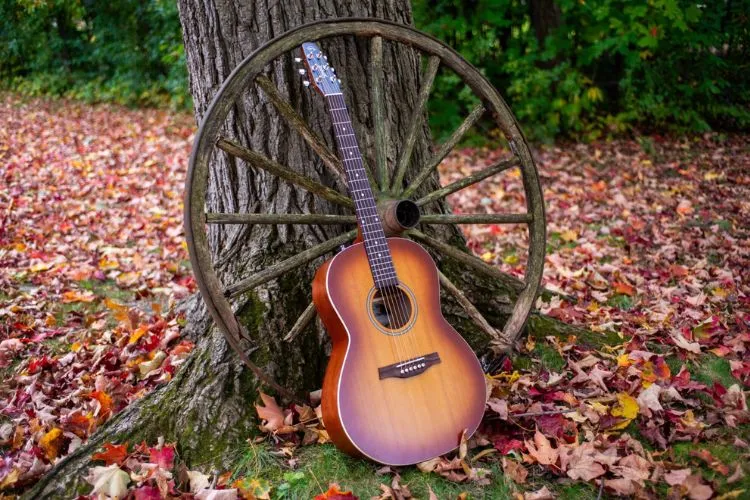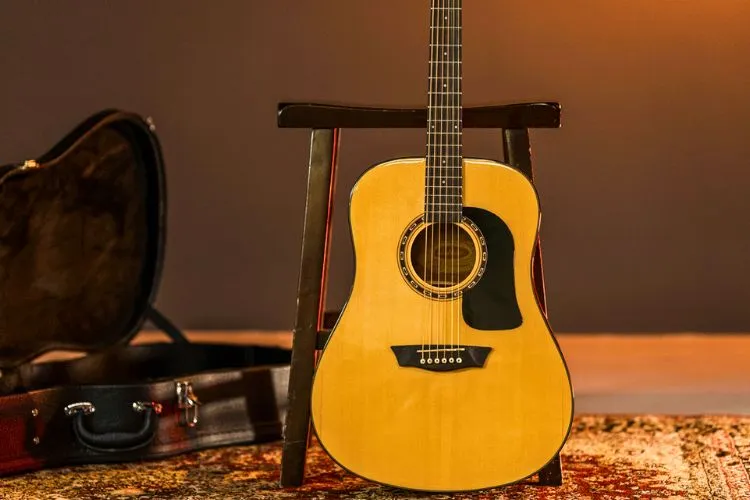The serene strumming that evokes images of intimate gatherings and the rustic voice of Americana can often be traced back to the use of a folk acoustic guitar.
Unlike its classical and electric counterparts, the folk acoustic guitar has a distinctive place in the pantheon of musical instruments.
It is a tool of expression favored by singer-songwriters and instrumental virtuosos alike.

Contents
- 1 🎶What Is A Folk Acoustic Guitar?
- 2 🎶Anatomy of A Folk Acoustic Guitar
- 3 🎶Features That Make A Guitar ‘Folk’
- 4 🎶How to Choose the Right Folk Acoustic Guitar
- 5 🎶Maintaining Your Folk Acoustic Guitar
- 6 🎶Famous Folk Acoustic Guitarists and Their Guitars
- 7 🎶The Role of Folk Acoustic Guitars in Modern Music
- 8 🎶Frequently Asked Questions (FAQs)
🎶What Is A Folk Acoustic Guitar?
A folk acoustic guitar is an instrument built for the nuances of the folk music genre.
Defined by its rich tonal quality and ease of play, this type of guitar is designed to accompany the human voice and meld seamlessly with other traditional acoustic instruments.
Tracing its origins back to early 20th-century Americana, the folk guitar is the result of a melting pot of cultural influences, incorporating elements from European and African stringed instruments.
The folk acoustic guitar stands out from other guitars with its specific shape and size, which are tailored for a clear, balanced sound that suits folk melodies.
This distinguishes it from larger-bodied guitars like the dreadnought, which is revered for its volume and power, making the folk guitar’s softer and more nuanced sound perfect for storytelling through music.
🎶Anatomy of A Folk Acoustic Guitar
A folk guitar’s body is usually smaller and narrower than many acoustic guitars. This feature contributes to its distinctive sound and makes it comfortable to play, especially for those with smaller frames.
The various types of wood used in construction, like spruce, mahogany, or cedar, each impart their own character to the instrument’s sound.
While mahogany offers a warm, rich tone, spruce brings brightness and articulation to the guitar’s voice.
Steel-stringed folk guitars generate the crisp, articulate sound often associated with folk music. These strings allow for both bold strumming patterns and delicate fingerpicking.
The sound hole, located in the guitar’s top, projects the sound outward, while internal bracing patterns support the structure and contribute to sound quality.
Scale length, which is the distance from the nut to the saddle, affects both the tension of the strings and the spacing between frets.
Folk guitars generally have a mid-range scale length that provides a balance between comfortable hand stretching and sound clarity.
🎶Features That Make A Guitar ‘Folk’

What differentiates a folk guitar are its subtle design nuances aimed at playability and tonal quality. The action, or height of the strings above the fretboard, is typically lower on folk guitars, facilitating easier playing.
The neck width is usually slimmer, accommodating intricate fingerstyle techniques and quick chord changes common in folk music.
The sound of a folk guitar is one of its defining features. It has a balanced profile that supports the voice without overpowering it.
Folk guitars tend to have a mid-range emphasis, providing warmth and clarity without excessive bass that could muddy the sound.
🎶How to Choose the Right Folk Acoustic Guitar
Choosing the right folk acoustic guitar involves consideration of your level of skill, the sound you seek, and your budget.
For beginners, an entry-level model that is comfortable to play and stays in tune may be the best starting point.
More seasoned players might look for specific tonewoods or handcrafted designs that offer richer sounds and better responsiveness.
Trying out guitars in person is ideal. You can hear the subtle sound differences and feel the playability of each instrument.
The right guitar will not only sound good but will also feel like an extension of your musical expression.
🎶Maintaining Your Folk Acoustic Guitar
Maintaining a folk acoustic guitar is key to its longevity and sound quality. Regularly clean the guitar with a soft cloth, change the strings often, and monitor the instrument for signs of wear or damage.
Store it in a case, away from extreme temperatures and humidity. This ensures that the wood doesn’t warp and the strings stay in optimal condition.
🎶Famous Folk Acoustic Guitarists and Their Guitars

Icons like Bob Dylan, Joni Mitchell, and Woody Guthrie have all favored folk acoustic guitars for their legendary contributions to the music world.
They chose instruments that complemented their distinctive playing styles and helped define the sound of a generation.
Through their choice of guitars, these artists also influenced the craft of guitar making, pushing manufacturers to pay great attention to the design elements that support the folk music genre.
🎶The Role of Folk Acoustic Guitars in Modern Music
Despite the genre’s roots in bygone eras, folk acoustic guitars continue to be a staple in modern music. Contemporary artists and bands still reach for these instruments, valuing their timeless sound and the authentic touch they add to their music.
The folk guitar’s adaptability to various music styles ensures its relevance and endearing presence in the world of music.
🎶Frequently Asked Questions (FAQs)
A folk guitar typically has steel strings, a narrower neck, and a brighter, more projecting sound compared to the nylon-strung, wider-necked classical guitars.
While folk music traditionally features acoustic instruments, electric guitars can be incorporated for a modern twist, providing a different texture and amplification options.
Quality folk guitars can vary greatly in price, from affordable models under $300 to custom, handcrafted instruments costing several thousand dollars.
Yes, their comfortable size and playability make folk acoustic guitars an excellent choice for beginners.
Brands like Martin, Taylor, Gibson, and Yamaha are known for producing folk guitars renowned for their quality and sound.
Conclusion
Folk acoustic guitars have not only shaped the course of musical history but also remain integral to the fabric of modern music.
Their design, characterized by finesse and functionality, supports musicians in spinning narratives set to melody, resonant with the human experience.
Whether you are a novice or a seasoned player, the journey of exploring folk guitars is bound to be as enriching as the music they produce.
